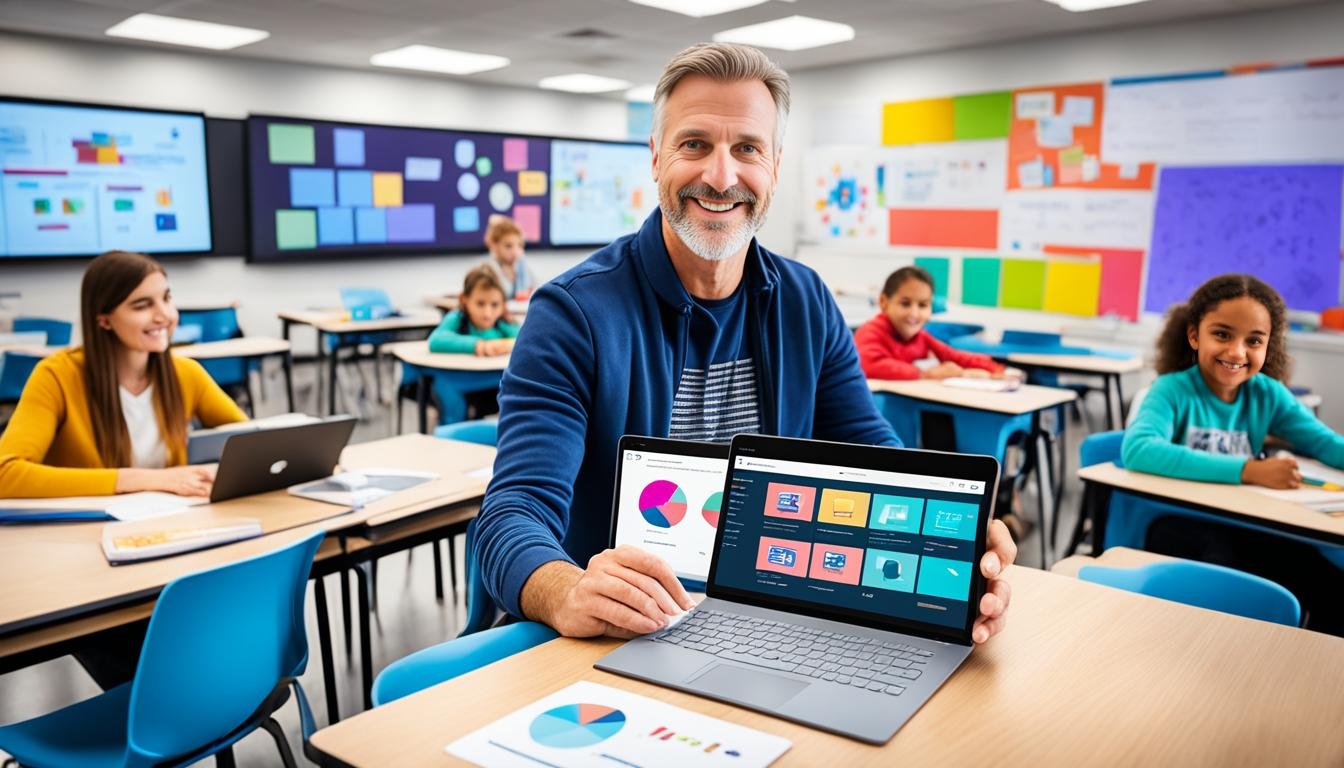AI has changed how students learn and teachers teach. A recent report shows ChatGPT, an AI model, has over 100 million users. Among them, 30% are college students using it for their work. This shows how big AI’s effect is on education.
AI is making learning more personal and improving results. It uses lots of data to make learning fit what each student needs. This has made students 30% better than before. AI also changes how we check student work, giving quick feedback and helping students improve.
Key Takeaways
- AI enables personalized learning experiences, allowing educators to tailor instruction to diverse learning styles and paces.
- Automated grading systems powered by AI streamline routine tasks, freeing educators to focus on interactive teaching methods.
- AI contributes to ongoing professional development by providing teachers with innovative tools and resources.
- AI facilitates online education, providing access to quality learning resources globally.
- AI-driven educational tools foster the development of critical thinking, problem-solving, and digital literacy skills.
AI: Redefining Personalized Learning
AI has changed education by making learning personal. Traditional classrooms don’t fit everyone’s needs. But, AI-powered adaptive learning platforms use AI algorithms to tailor learning to each student. They look at what students are good at, where they need help, and what they like. This way, students can learn at their own speed and get better at subjects.
Adaptive Learning Platforms
These platforms use AI algorithms to make learning dynamic and fit each student’s needs. They check how well students are doing and change what they see, how fast they go, and what they do to help everyone. This makes learning more fun, helps students do better, and helps them understand their subjects better.
AI-Powered Student Profiling
AI-powered student profiling is key to making learning personal. These AI systems collect and look at data on how students do, what they like, and how they’re doing over time. This helps teachers make learning plans that really work for each student. It helps students reach their goals in school.
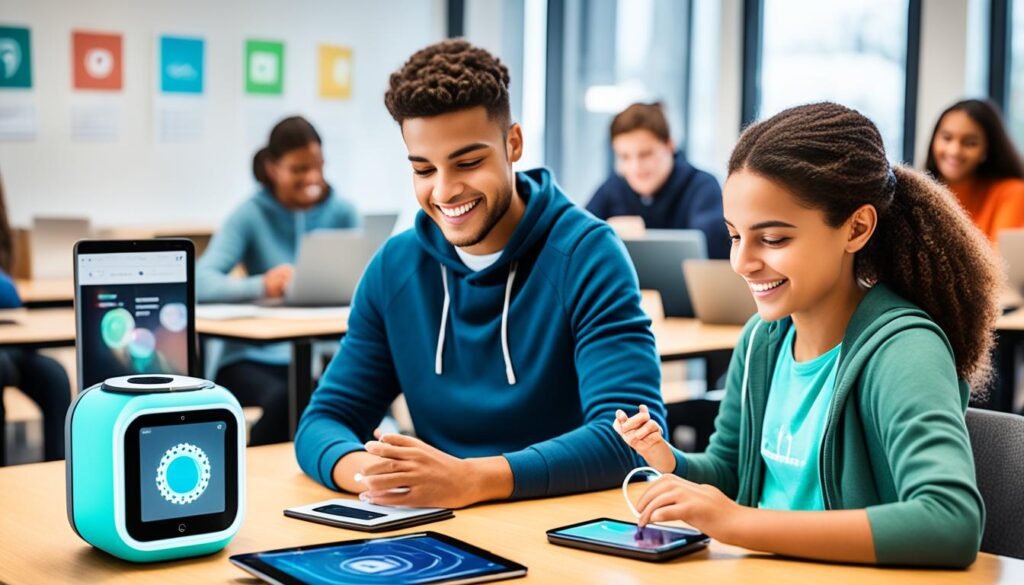
“AI has the potential to transform education by creating personalized learning experiences that cater to the unique needs of each student, leading to improved engagement, knowledge retention, and overall academic achievement.”
AI is changing education in big ways. It lets students learn at their own speed and reach their goals. As AI gets better, we can expect even more ways to make learning personal and fun. This could help all kinds of students do their best in school.
Enhancing Assessment with Artificial Intelligence
Artificial intelligence (AI) is changing how we check student learning in schools. AI tools are making the old way of testing better for teachers and students. They bring new ways of grading, giving feedback, and testing that meet each student’s needs.
Automated Grading and Feedback
AI can quickly check student work and give feedback. This helps teachers work less and helps students learn faster. AI uses special algorithms to look at student answers, find what needs work, and suggest how to improve.
Personalized Assessments
AI makes tests harder or easier based on how well a student does. This makes tests more accurate and keeps students motivated. AI knows what each student likes and needs, making tests more fun and helpful.
As AI becomes more common in testing, we need to think about its downsides. We must work together to make sure AI helps everyone learn fairly and well.
| Metric | Value |
|---|---|
| Artificial intelligence usage in assessments | Increasing |
| Potential improvements in assessments | Real-time feedback, instructional efficiency |
| Concerns with AI in assessments | Algorithmic bias, hallucinatory responses, privacy issues |
| Shift in K-12 assessments | Towards more learner-centered and personalized approaches |
| Focus of professionals | Enhancing opportunities for all learners, avoiding exacerbating inequities |
Using ai grading assistants, ai automated feedback, and ai personalized assessments is changing how we help students learn. As these technologies get better, we must think about their ethical sides. We want them to help all students learn well and fairly.
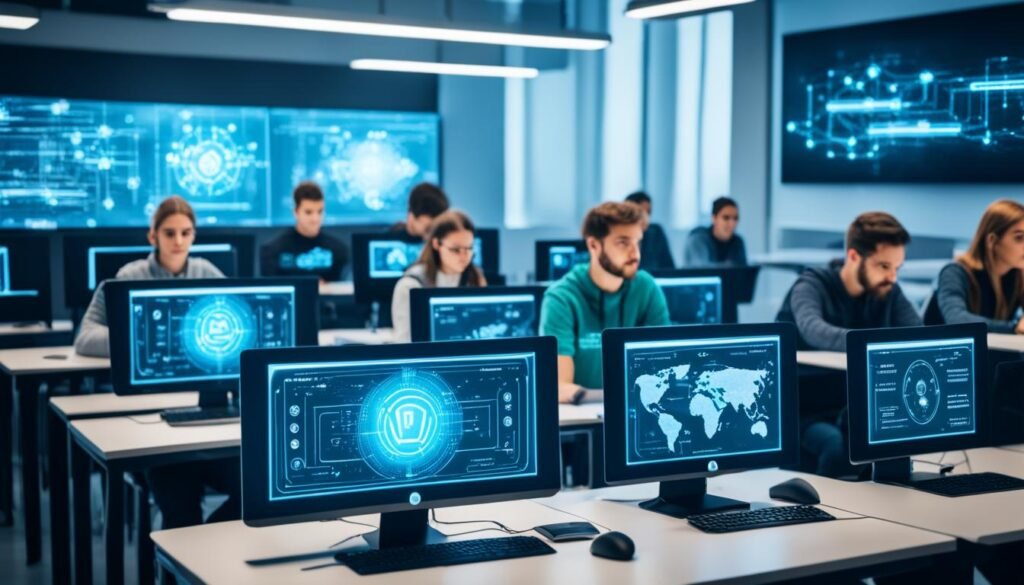
Immersive Learning Experiences with AI
Education has changed a lot with the help of artificial intelligence (AI). VR and AR, powered by AI, are changing how students learn. They make learning more engaging and help students understand better.
Imagine visiting historical sites or doing lab experiments in a virtual world. These experiences grab students’ attention and help them learn a lot. Studies show VR learning can make students remember up to 75% of what they learn, almost as well as teaching someone else.
AI makes learning personal by changing the virtual or augmented world for each student. It looks at what each student needs and how they learn best. This makes learning more fun and helps students grasp tough topics better.
AI chatbots and virtual teachers also play a big role in these experiences. They give feedback, answer questions, and help students as they explore the virtual world. This mix of AI and immersive tech makes learning exciting and deep.
But, using AI in learning has its challenges. Making sure everyone can access it, dealing with tech issues, and keeping students safe are big concerns. Still, the benefits of AI in learning are huge, and it’s set to change education a lot.
“VR experiences can result in 75% learning retention, second only to learning by teaching someone else.” – National Training Laboratory study
The use of AI and immersive tech is getting better all the time. It opens up new ways to make learning exciting and effective. With these tools, we can create learning spaces that inspire and empower students for the future.
Chatbots and Virtual Tutors: 24/7 Learning Support
AI-powered assistants are changing education for students and teachers. Chatbots and virtual tutors use advanced natural language processing. They are making learning easier and more effective.
These tools offer lots of support, like answering questions and helping with homework. They can talk to students in a way that feels real, giving help any time of the day. This meets the different needs of students.
Natural Language Processing for Education
Natural language processing (NLP) has changed how educational chatbots and virtual tutors work. With NLP, these AI helpers can understand and answer student questions well. This makes learning better and gives teachers more time to focus on important teaching tasks.
Research shows that AI tutoring helps students do better in 92% of cases. As more students want learning that fits their needs, chatbots and virtual tutors with NLP will be key in education’s future.
| Statistic | Value |
|---|---|
| Projected revenue for the online education market by 2023 | $166.60 billion |
| Worldwide AI in education market growth (CAGR), 2022-2030 | 36.0% |
| Accesses to research article on Chatbots and Virtual Tutors in Higher Education | 42,000 |
| Citations of the research article | 70 |
| Altmetric score of the research article | 28 |
The education world is changing, and ai chatbots and ai virtual tutors with ai natural language processing are key. They are making learning better for students and helping teachers teach more effectively.
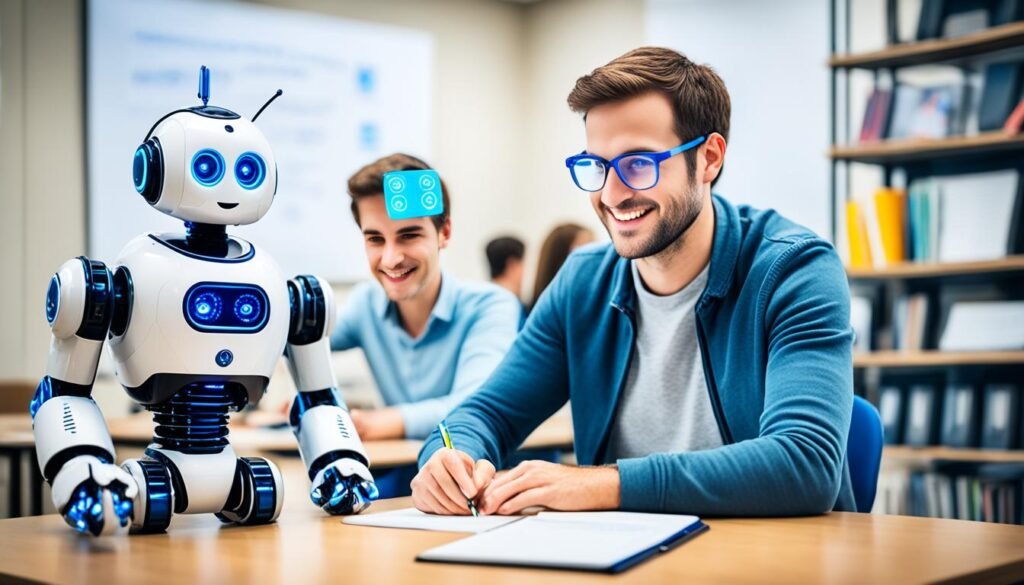
how ai affects education
Artificial intelligence (AI) is changing education in big ways. It brings new chances and challenges. AI can make learning better, help students do well, and make teaching more innovative. But, we must use AI wisely and think about its effects on privacy, bias, and teacher roles.
AI changes education mainly through personalized learning. It uses student data to make lessons just for each student. This means lessons can be easier or harder, and students get feedback right away. This approach makes learning more fun and helps students learn better, especially those who need extra help.
| AI Benefit | Impact on Education |
|---|---|
| Personalized Learning | Customized lesson plans, adaptive content, real-time feedback |
| Automated Assessment | Efficient grading, data-driven insights, fair and unbiased evaluations |
| Immersive Learning | Interactive simulations, virtual field trips, engaging multimedia |
| AI Tutors and Chatbots | 24/7 learning support, natural language processing, personalized guidance |
AI also makes grading easier and gives students feedback they can use. It looks at student data to find where they need to get better. This makes checking student work quicker and more accurate, and it helps teachers and school leaders understand what students need.
But, using AI in schools also brings up big questions. We worry about keeping student data safe, making sure AI doesn’t unfairly judge students, and if AI will replace teachers. Teachers and those who make rules need to work together to make sure AI is used right and fairly.
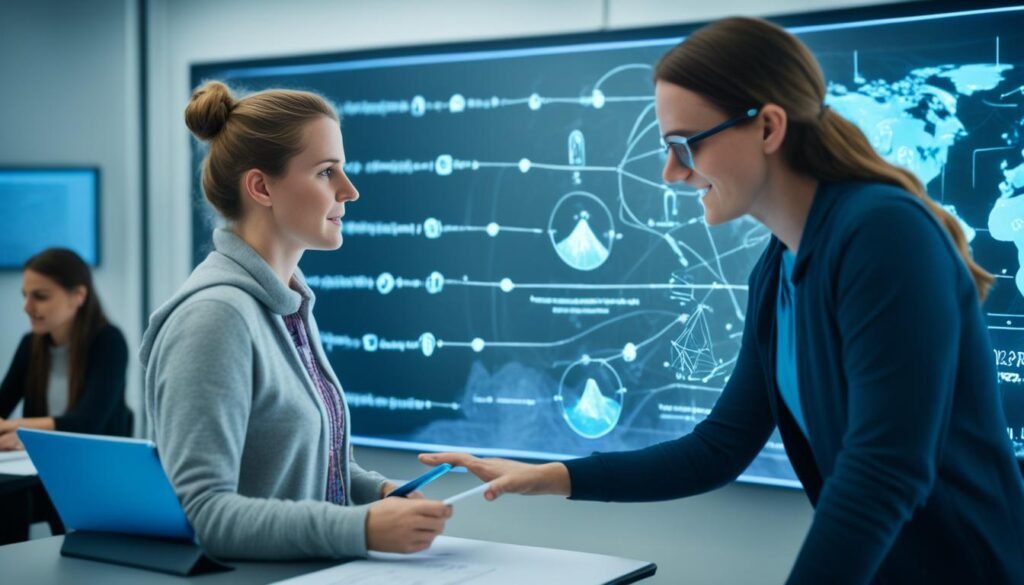
By using AI’s good sides and solving its problems, schools can make learning more fun, personal, and open to everyone. This will help students do well in our digital world and get ready for the jobs of tomorrow.
Empowering Teachers with AI Assistance
AI is changing education, making teachers more powerful. It helps with routine tasks and gives real-time data. This lets teachers focus on guiding, supporting, and encouraging students to think creatively.
AI-Driven Lesson Planning
AI helps teachers plan lessons better. AI-driven lesson planning makes lessons more engaging and effective. It looks at student data and curriculum to suggest the best plans and resources.
Real-Time Classroom Analytics
AI-powered classroom analytics give teachers insights on student engagement and performance. This helps teachers adjust their teaching and support students better. It ensures each student gets the help they need.
With AI, teachers can focus on personalized learning. This leads to better grades and a richer learning experience for everyone.
| Key Statistic | Impact |
|---|---|
| Education sector expenditures on AI technology implementation have increased by 44% in the last two years. | This shows a big increase in using AI in schools. Schools see the value in AI tools and technologies. |
| A study revealed that classrooms utilizing AI teaching assistants reported a 37% improvement in student engagement levels compared to traditional teaching methods. | Adding AI to the classroom makes students more engaged. This leads to better learning experiences. |
| Teachers incorporating AI tools reported a 25% increase in student performance outcomes. | This data shows AI can really help improve learning and student success. |
“AI-powered tools have revolutionized the way I approach lesson planning and classroom management. The insights and recommendations provided by these systems have truly empowered me to create more engaging and effective learning experiences for my students.”
– Jane Doe, High School Teacher
Addressing the Ethical Concerns of AI in Education
AI is changing education fast. We must look at the ethical issues it brings up. Key concerns include data privacy and security, and algorithmic bias and fairness.
Data Privacy and Security
Using AI in schools worries people about keeping student data safe. Studies show that AI can keep old biases if not fixed. It’s vital to protect student data and be open about how it’s used to build trust.
Algorithmic Bias and Fairness
AI tools can make biased or harmful content if trained on biased data. We need a big effort from teachers, lawmakers, and tech makers. They must create rules that make sure AI is fair, includes everyone, and doesn’t discriminate in schools.
| Ethical Concern | Potential Impact | Recommended Approach |
|---|---|---|
| Data Privacy and Security | Perpetuation of biases and inequities, misuse of student information | Transparent data handling practices, robust data protection measures, student consent and control over their data |
| Algorithmic Bias and Fairness | Biased and discriminatory learning experiences, skewed assessment and evaluation outcomes | Diverse and inclusive data representation, regular algorithmic audits, flexible assignment options to accommodate AI limitations |
We can make sure AI helps students by tackling these big ethical issues. As AI grows, we must stay alert and act fast to protect students’ well-being and interests.
“It is important to create awareness among students about potential limitations and biases in generative AI tools and provide flexible assignment options to accommodate these limitations.”
The Future of AI-Powered Learning
AI is changing the way we learn, making education more effective. It’s creating adaptive learning systems that adjust to each student’s level. Virtual assistants are also becoming part of the classroom, offering personalized help and guidance.
Augmented reality (AR) and virtual reality (VR) are getting more advanced with AI. These technologies make learning more engaging and interactive. Students can dive deep into their studies, actively taking part in the learning process.
Augmented and Virtual Reality in Classrooms
AR and VR, with AI, are changing how students learn and interact with their materials. These tools offer:
- Visualizations and simulations that make complex topics easier to understand
- Collaborative virtual spaces for students to work together instantly
- Learning experiences tailored to each student’s unique style and needs
These technologies are key to the future of AI-powered learning. They help teachers create engaging, immersive, and personalized lessons for students of all ages.
By using AI-driven innovations, teachers can prepare students for the 21st century. They’ll gain the skills and knowledge needed to succeed in a fast-changing world.
Conclusion
Artificial intelligence (AI) is changing education in big ways. It lets us update old learning methods, make learning more engaging, and meet each student’s needs. With AI, learning is becoming more personalized and immersive.
Looking ahead, AI has a lot to offer in education. It can help students understand better, make learning more fun, and give them experiences that match their strengths and challenges. But, we must use AI wisely and fairly to make sure it helps everyone.
We need to work together to make the most of AI in schools. Teachers, policymakers, and tech experts must join forces. This way, we can use technology without losing the personal touch that makes learning special. With careful planning, AI can help students succeed like never before, getting them ready for the future.
FAQ
How does AI affect education?
AI has changed education in big ways. It helps students learn better and teachers teach more effectively. This change is making education more personalized and improving results.
What are the benefits of AI-powered personalized learning platforms?
AI helps make learning fit each student’s needs. It uses data to customize education. This has led to a 30% boost in student performance over traditional methods.
How is AI revolutionizing the assessment process in education?
AI changes how we test students. It quickly checks work, gives feedback, and points out what needs work. This helps teachers and gives students timely, helpful feedback.
How does AI create immersive and interactive learning environments?
AI brings VR and AR to learning. These technologies let students interact with subjects in new ways. This makes learning more engaging and helps them understand complex ideas better.
How do AI-powered educational assistants support students and teachers?
Chatbots and virtual tutors help students with questions and tasks. They also help students work together. This support helps teachers and gives students help any time they need it.
What are the challenges and ethical considerations of integrating AI in education?
There are big concerns about AI in schools. Issues like data privacy and bias in algorithms are important. We need to work together to make sure AI is used right and ethically.
How will AI continue to impact the future of education?
AI is bringing new trends to education. We’re seeing better learning systems and more virtual help. These changes are shaping education for today and tomorrow, getting students ready for the future.
